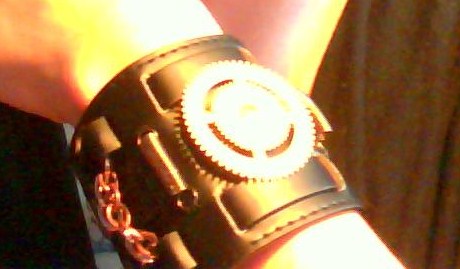My dayjob office is in an old building on Water Street, St. John’s. I have a grand window view, a door with an ornate and functional slot engraved “LETTERS,” and a hot water radiator that puts out the beat heat – electric baseboards this time of year smell of summer’s dust, slowly roasting.
The building is a designated heritage site, as it should be. Amongst other things, the original brickwork is intact and should most certainly not be disturbed.
No architect, me, but I’m guessing there’s little to no insulation between the inner and outer walls. We had frost this morning, and the air is as cold and sharp as concrete when it tears your skin.
So behind me is a delicious baking heat. Besides and in front of me is an insistent cold draught – no comfort here. My legs are chilled. Me toes are nearly numb. My hands were icy until I wrapped them round the rad.
Is this the cost of history? Knowledge that’s necessary and blatant but hardly soothing?
Profound, Michelle. Don’t give up your dayjob.
Friday, October 12, 2007
Thursday, October 11, 2007
Weaving in Limbo
Third month of Prozac is here. Not that I’m crossing off the days to count the pills, but I am tracking change, Not going to call it recovery yet – not going to attempt to define “recovery” either, not when melancholy is part of the human condition – but I am feeling better.
Or perhaps that should be “stronger.”
The sinkhole of weird emotional pain – imagine being scalded, non-stop – remains, but with meds I can get perspective. I can also get out of my own way. Psychomotor retardation, that heavy and dense compulsion to not be compelled, to simply stay put because nothing could possibly be worth the gargantuan effort it takes to move, now only settles on me in the evening, like dust in darkness.
So, the use of this depression? The craftsman in me wants to use every last scrap, every woodshaving, even the sawdust, file it on a shelf for later. Must salvage, must put together, must create.
A character in my next novel, Sky Waves, has manic-depression, or bipolar illness as it’s sometimes called – as though the illness were as simple as two poles, or as though depression were as simple as one. Her addictive manias propel huge ideas and plans, but she for all her drive she lacks focus and discipline. This lack is not a character flaw, as is long thought, but a symptom. She’s damaged by other things, too, rendering her delicate and brittle. While I’ve had clinical depression before, I’ve gotten some new understandings this time round – or some deeper understandings. Every scrap will go into this book.
Or perhaps that should be “stronger.”
The sinkhole of weird emotional pain – imagine being scalded, non-stop – remains, but with meds I can get perspective. I can also get out of my own way. Psychomotor retardation, that heavy and dense compulsion to not be compelled, to simply stay put because nothing could possibly be worth the gargantuan effort it takes to move, now only settles on me in the evening, like dust in darkness.
So, the use of this depression? The craftsman in me wants to use every last scrap, every woodshaving, even the sawdust, file it on a shelf for later. Must salvage, must put together, must create.
A character in my next novel, Sky Waves, has manic-depression, or bipolar illness as it’s sometimes called – as though the illness were as simple as two poles, or as though depression were as simple as one. Her addictive manias propel huge ideas and plans, but she for all her drive she lacks focus and discipline. This lack is not a character flaw, as is long thought, but a symptom. She’s damaged by other things, too, rendering her delicate and brittle. While I’ve had clinical depression before, I’ve gotten some new understandings this time round – or some deeper understandings. Every scrap will go into this book.
Subscribe to:
Comments (Atom)
Spark-gap transmission / Michelle Butler Hallett

in progress
